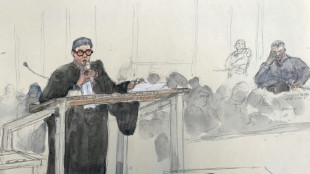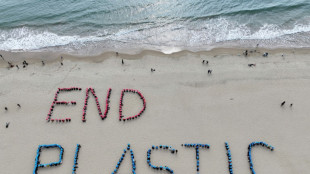
-
 Coffee price heats up on tight Brazil crop fears
Coffee price heats up on tight Brazil crop fears
-
Maeda salvages Celtic draw against Club Brugge

-
 Villa denied late winner against Juventus
Villa denied late winner against Juventus
-
Dortmund beat Zagreb to climb into Champions League top four

-
 Mbappe misses penalty as Liverpool exact revenge on Real Madrid
Mbappe misses penalty as Liverpool exact revenge on Real Madrid
-
Brazil's top court takes on regulation of social media

-
 Thousands still queuing to vote after Namibia polls close
Thousands still queuing to vote after Namibia polls close
-
Trump taps retired general for key Ukraine conflict role

-
 Canadian fund drops bid for Spanish pharma firm Grifols
Canadian fund drops bid for Spanish pharma firm Grifols
-
Argentine ex-president Fernandez gives statement in corruption case

-
 Mexico says Trump tariffs would cost 400,000 US jobs
Mexico says Trump tariffs would cost 400,000 US jobs
-
Car-centric Saudi to open first part of Riyadh Metro

-
 Brussels, not Paris, will decide EU-Mercosur trade deal: Lula
Brussels, not Paris, will decide EU-Mercosur trade deal: Lula
-
Faeces, vomit offer clues to how dinosaurs rose to rule Earth

-
 Ruby slippers from 'The Wizard of Oz' up for auction
Ruby slippers from 'The Wizard of Oz' up for auction
-
Spain factory explosion kills three, injures seven

-
 US Fed's favored inflation gauge ticks up in October
US Fed's favored inflation gauge ticks up in October
-
Defence lawyers plead to judges in French mass rape trial

-
 US says China releases three 'wrongfully detained' Americans
US says China releases three 'wrongfully detained' Americans
-
New clashes in Mozambique as two reported killed

-
 Romania officials to meet over 'cyber risks' to elections
Romania officials to meet over 'cyber risks' to elections
-
Chelsea visit next stop in Heidenheim's 'unthinkable' rise

-
 Former England prop Marler announces retirement from rugby
Former England prop Marler announces retirement from rugby
-
Kumara gives Sri Lanka edge on rain-hit day against South Africa

-
 Namibia votes with ruling party facing toughest race yet
Namibia votes with ruling party facing toughest race yet
-
Spurs goalkeeper Vicario out for 'months' with broken ankle

-
 Moscow expels German journalists, Berlin denies closing Russia TV bureau
Moscow expels German journalists, Berlin denies closing Russia TV bureau
-
Spain govt defends flood response and offers new aid

-
 France says Netanyahu has 'immunity' from ICC warrants
France says Netanyahu has 'immunity' from ICC warrants
-
Nigerian state visit signals shift in France's Africa strategy

-
 Stock markets waver as traders weigh Trump tariffs, inflation
Stock markets waver as traders weigh Trump tariffs, inflation
-
Tens of thousands in Lebanon head home as Israel-Hezbollah truce takes hold

-
 Opposition candidates killed in Tanzania local election
Opposition candidates killed in Tanzania local election
-
Amorim eyes victory in first Man Utd home game to kickstart new era

-
 Fresh fury as Mozambique police mow down protester
Fresh fury as Mozambique police mow down protester
-
Defeat at Liverpool could end Man City title hopes, says Gundogan

-
 Indonesians vote in regional election seen as test for Prabowo
Indonesians vote in regional election seen as test for Prabowo
-
Guardiola says no intent to 'make light' of self harm in post-match comments

-
 New EU commission gets green light to launch defence, economy push
New EU commission gets green light to launch defence, economy push
-
Opposition figures killed as Tanzania holds local election

-
 Taiwan Olympic boxing champion quits event after gender questions
Taiwan Olympic boxing champion quits event after gender questions
-
European stocks drop on Trump trade war worries

-
 Volkswagen to sell operations in China's Xinjiang
Volkswagen to sell operations in China's Xinjiang
-
FA probes referee David Coote over betting claim

-
 Serbia gripped by TV series about murder of prime minister
Serbia gripped by TV series about murder of prime minister
-
Putin seeks to shore up ties on visit to 'friendly' Kazakhstan

-
 New EU commission pushes for defence and economy spending
New EU commission pushes for defence and economy spending
-
Plastic pollution talks must speed up, chair warns

-
 Pakistan web controls quash dissent and potential
Pakistan web controls quash dissent and potential
-
1,000 Pakistan protesters arrested in pro-Khan capital march


Like none other: profound impact of conservative US Supreme Court
Two years after President Donald Trump filled its ranks with conservatives, the US Supreme Court has engineered a sharp turn in US constitutional law that could have a profound effect on American life for decades.
Key decisions that rescinded abortion rights, permit Americans to tote their guns freely in public, expand religion in schools, remove voting rights protections, and impede the government's ability to set controls on greenhouse gases, have turned long-accepted rules of justice on their heads.
With a 6-3 majority on the bench, the conservatives led by Chief Justice John Roberts represent a mighty swing of the judicial pendulum from decades of a modestly progressive course.
Politically, the Roberts court is effectively payback by the Republican right, which has since the 1970s endeavored to claim control of the high court to reverse key decisions they view as excessive.
But analysts say the just-closed annual court season has revealed a set of judges more hard-line than anyone anticipated.
They have brashly tossed out the decisions of their respected predecessors, including, as with abortion, rights that previous courts said were guaranteed by the constitution.
"It's not unusual to see the pendulum swinging, and to have what might be considered course-corrections," said American University constitutional law professor Stephen Wermiel.
But in the term just ended, he said, the court took "a dramatic and sudden shift in a far more conservative direction."
"Two generations of Americans, maybe more, have grown up knowing certain sets of rights," Wermiel said.
"This is the rare instance in which the Supreme Court has dramatically taken back constitutional rights," he said.
- Political alignment -
"The last time there was an ideologically cohesive court was the Warren court, and that court pursued liberal objectives" said Neal Devins, a Supreme Court expert at the William & Mary University law school.
Led by Chief Justice Earl Warren, over 16 years from 1953 to 1969 that court made transformative decisions that expanded civil rights and civil liberties.
It effectively ended segregation of whites and Blacks, increased the power of the federal government, curtailed official Christian prayer sessions in public schools, and laid the ground for the 1973 decision that made abortion a constitutional right.
Warren's team overturned plenty of precedents, and was viewed with as much outrage by conservatives as liberals see the Roberts court.
But Devins points to stark differences. Four of the Warren court's conservative members were appointed by a Democratic president, and two liberal justices were chosen by a Republican.
On many crucial decisions, justices from both sides were in the majority and the dissenting minority. Their decisions did not cleanly align with the political divide between Republicans and Democrats.
Indeed, five of the seven justices who backed the 1973 abortion decision were appointed by Republicans.
In the current court, the conservatives were all appointed by Republican presidents -- three by Trump -- and there is far less crossover between the two sides, said Devins.
While the justices might not be consciously thinking in terms of Republican or Democratic politics, "This court is divided not just along ideological but along political party lines," said Devins.
Moreover, the decisions of the conservative six hew farther to the right than many Republicans appear to support.
"This court is willing to go further doctrinally than other courts," Devins said.
- Not our job -
Noteworthy about the Roberts court is its deep belief that the Supreme Courts of the past, like Warren's, took on issues that they had no business deciding.
For example, they said abortion is not a right in the constitution but a moral issue to be decided by the voters of each state.
And only Congress, not an independent government agency, has the broad power to establish things like regulatory caps for greenhouse gases, they said.
The current way government functions, Justice Neil Gorsuch wrote critically, reflects "the explosive growth of the administrative state since 1970."
However, critics say that ignores the reality that the states themselves are deeply divided over abortion, creating a deeply unequal environment for women.
And they say that government cannot function if regulatory agencies cannot implement policy.
"The court knows that Congress is effectively dysfunctional," said Harvard University law professor Richard Lazarus.
Yet it "threatens to upend the national government’s ability to safeguard the public health and welfare at the very moment when the United States, and all nations, are facing our greatest environmental challenge of all."
- Just getting going -
There is little sign that the conservative bloc will slow down. They have accepted more potentially landmark cases for the next term beginning in September, on affirmative action, election laws, and more on regulation of business.
"This court is just getting going. What they accomplish remains to be seen," said Devins.
Conservatives "now have an opportunity for the direction, after 50 years, to dramatically change," noted Wermiel. "And their view is they're not going to blow that opportunity."
J.Fankhauser--BTB
